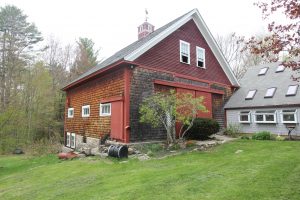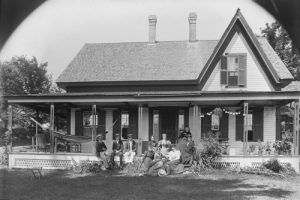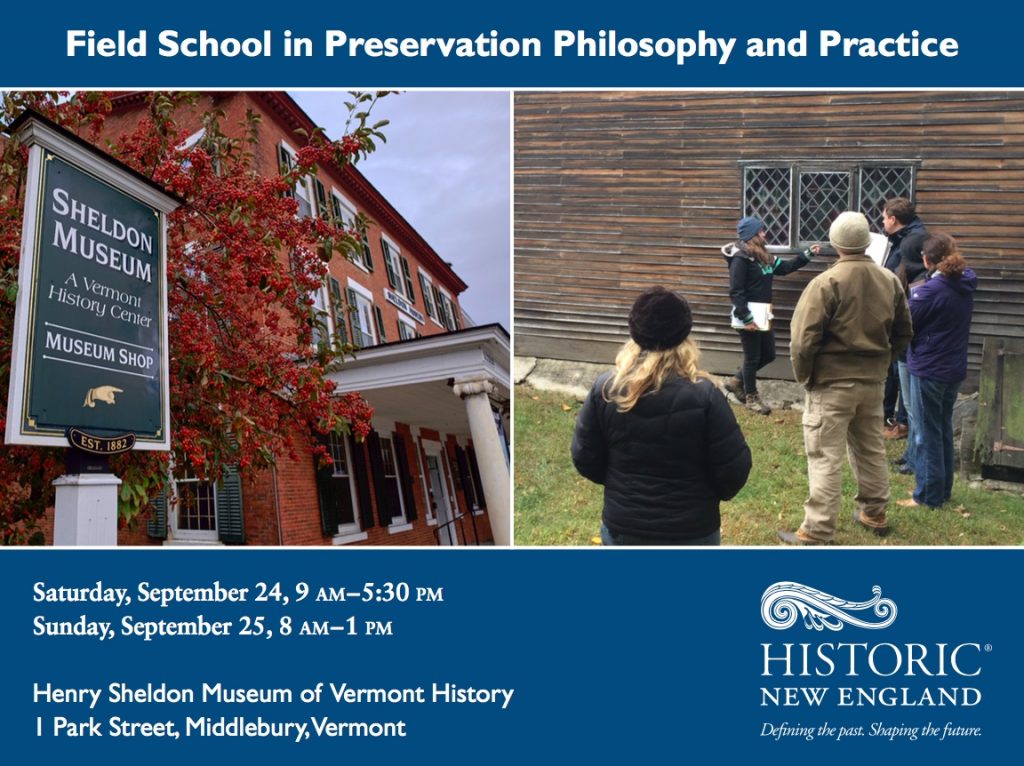The following article about the Center Harbor barn survey project appeared recently on NewHampshire.com:
December 23. 2017 5:33PM
Historic barns connect NH to its rural past
CENTER HARBOR — As family farms continue to fade, a Lakes Region group is determined to identify and preserve historic barns that once stood at the heart of agrarian life here.
The Center Harbor Heritage Commission has partnered with volunteer Rick Kipphut to document every barn 50 years or older in town. The project is a joint effort with the New Hampshire Preservation Alliance’s “52 Barns in 52 Weeks” campaign to increase awareness of the need to preserve these symbols of the state’s rural roots.
Farmers built barns to shelter livestock and store hay and harvest. The structures evoke a sense of tradition and permanence, and embody the close connection the people who built them and worked in them had to the land, said Kipphut. He has surveyed 15 barns in Center Harbor already, has 20 more on his list and is on the hunt for more.
Recently, Kipphut documented the circa 1876 Longwood Farm barn on Route 25, next door to Camp Restaurant. It once housed a prize-winning herd of Guernsey cattle owned by Edward Sereno Dane. Kipphut also surveyed the 1903 Keewaydin dairy barn on Route 25B, a landmark that stands out for its unusual tile silo.
After making contact with barn owners via postcard, Kipphut makes arrangements to visit the property. On average, he spends three to four hours at a barn, making notes and occasionally answering questions the present owner might have about its construction, use or history.
Sometimes Kipphut is on the receiving end of information as owners regale him with their barn’s provenance and providence through generations. “People have been very gracious. They are connected to their barns, their history, and are proud of them,” Kipphut said.
During the survey, Kipphut fills out a farm reconnaissance inventory that documents construction materials and features. He photographs each barn inside and out and the pictures are digitally embedded in the completed report, which is shared with the property owner and will be added to Center Harbor’s “Cultural and Historical Resources Inventory” as part of the update of the town’s master plan.
Kipphut also informs owners as to the resources available to help maintain their historic barn. Signed into law in 2002, RSA 79-D authorizes municipalities to grant property tax relief to barn owners who can demonstrate the public benefit of preserving the structure and who agree to sustain it for a minimum of 10 years.
Kipphut graduated with a master’s degree in historic preservation from Plymouth State University in May. He came to historic preservation late in life after teaching business at Quinnipiac University.
When he’s not working as a staff member in the library at PSU, he puts his research skills to work, researching barns. “Everything is online when it comes to deed research. It’s very helpful,” he said. Before taking on the Center Harbor project, Kipphut surveyed the massive barn that is now home to one of the North Country’s most popular tourist spots and eateries, Polly’s Pancake Parlor in Sugar Hill. Property owners Kathie and Dennis Cote approached selectmen with information from the survey and were able to prove the public benefit of preserving the circa 1886 structure. Following a public hearing, the couple was granted a tax break. “It not only safeguards a historic structure but a shared landscape resource,” Kipphut said of RSA 79-D.
On a recent Saturday as he set up a camera and tripod, Kipphut said barns are so much more than a nostalgic remnant of a bygone era. They are a slice of history that’s uniquely New Hampshire and worth appreciating, he said. The landmark structures not only make the past present, they reflect changing farming practices, construction techniques and technologies. The cultural value of a barn can’t be considered in isolation, Kipphut said. Many are intimately connected with the families who built them and are intertwined with the surrounding community. Weathered wood siding, a grand cupula, cut granite blocks, hand-hewn beams, mortise and tenon joinery, plank flooring scarred by decades of use — it all contributes to the special character of a barn.
A barn crowded by suburbs is not a barn in the same sense as a barn in its natural setting, amid other farm buildings, or so says Kipphut. He gestures across the street where off in the distance a barn stands handsomely with a forest behind and a pond in front. Preservation of barns can’t be divorced from preservation of the setting, he explains. As part of his work, Kipphut climbs hayloft ladders and navigates steep narrow staircases, photographing every detail. He revels in unique features, a hay trolley, the telltale marks of a draw knife on hewn beams, square hand-forged nails. Each detail is a clue as to the age and history of the barn, he says.
If you own an old barn and would like additional information or would like to participate in the survey, you can contact Rick Kipphut at 726-0925 or via email at researchthepast@gmail.com. There is no cost.
Barn Survey in Center Harbor
PSU Historic Preservation alumnus Rick Kipphut (’16G) has been busy surveying barns as part of Center Harbor’s effort to document the town’s historic structures. Here’s a recent press release describing Rick’s project:

Barn recently surveyed in Center Harbor.
Event Calendar
February 2-3, 2018
35th Annual New Hampshire Farm & Forest Expo
Manchester, NH
Info link: http://www.nhfarmandforestexpo.org
February 18, 2017
Rye Historical Society’s “Cabin Fever” Tea
Rye, NH
Info link: http://www.ryenhhistoricalsociety.org
March 4, 2017
30th Annual New England Conference on Industrial Archeology
Clark University, Worcester, MA
Info link: http://nec-sia.org/pdf/2017%20SNEC%20IA%20Conference%20Flyer.pdf
April 7, 2018
New Hampshire Land Conservation — Saving Special Places
Alton, NH
Info link: http://savingspecialplaces.org
Graveyard Workshop
October 29, 2016
434 South Road / Rye, NH
Workshop 9:30 to Noon
To get in the Halloween mood, join us Saturday October 29th for a Family Graveyard Care and Maintenance Workshop at the family burial ground adjoining 434 South Road in Rye. The New Hampshire Old Graveyard Association, will be running the hands on workshop and will cover all types of gravestone and Graveyard maintenance. Please park on South Road.
Refreshments will be served. All ages welcome. Any tools you can provide will be helpful. (Loppers, rakes, shovel, scrub brushes, limb saw etc.) This was so much fun last year, we hope to see you all there!
We have approximately 66 small graveyards in Rye. Ask us about how you can adopt one and care for it yourself! A great opportunity for family time!
James Tegeder
Rye Heritage Commission
Preservation Events
Historic Deerfield
October 6, 2016
First Church of Deerfield / 71 Old Main Street, Deerfield, MA 01342
Lecture 7:30 PM
David J. Brown, Executive Vice President and Chief Preservation Officer, National Trust for Historic Preservation, will present a free public lecture, The Future of Historic Preservation: Saving the Places that Matter.
Historic places create connections to our heritage that help us understand our past, appreciate our triumphs, and learn from our mistakes. Historic places help define and distinguish our communities by building a strong sense of identity. Deerfield is one of these great places in the American landscape: a Native homeland for twelve thousand years and a community of craftsmen, farmers, educators, and business people from the 17th century to the present. What’s different about Deerfield is that the scale of the 17th-century community survives intact with 26 18th-century houses and another 14 that predate 1850 along with important archeological evidence in a beautiful agricultural landscape.
Why are places like Deerfield important in America? And why should their preservation be prioritized? To ensure that their stories remain a part of our lives today, the National Trust for Historic Preservation protects and promotes historic places and maintains their own diverse collection of 27 sites. When you visit a historic site, you learn from their stories and help keep history alive.
Preservation Massachusetts
November 3, 2016
Worcester Historical Museum
Reception 5:00 PM / Program 6:00 PM
Every other Fall, Preservation Massachusetts hosts the Believe in Preservation fall event to announce the biennial Massachusetts Most Endangered Historic Resources list. The event is a great educational and networking opportunity for anyone interested in preservation in Massachusetts. The evening’s program will kick off with PM’s Annual Meeting and will feature our Most Endangered Program with updates about past listings and the presentation of 2016’s Most Endangered Historic Resources List.
PastForward — National Trust for Historic Preservation
November 15–18
Houston, Texas
Places. Livability. Voices. Tomorrow’s Heritage So Rich.
Learn more about this year’s PastForward themes with online session descriptions, speaker bios, and accompanying reading lists … a little homework before November’s conference!
At PastForward, November 15-18, we’ll explore how the activation of historic places can better tell stories, how preservation can play a greater role in securing more sustainable and just cities, and how we can uncover and tell the full American story through places. Also, we’ll celebrate the past and look forward to the future in honor of the 50th anniversary of the National Historic Preservation Act.
We want you to be part of these important discussions—register for PastForward today!
Celebrate preservation on October 28th
The N.H. Division of Historical Resources will host “We’re Golden: Celebrating 50 Years of the National Historic Preservation Act,” a daylong symposium focusing on historic preservation in the Granite State, in Concord on Oct. 28.
Signed by President Lyndon Baines Johnson on Oct. 15, 1966, the NHPA declared that “the historical and cultural foundations of the Nation should be preserved as a living part of our community life and development in order to give a sense of orientation to the American people.”
“We’re Golden” will include presentations describing a wide range of New Hampshire preservation success stories, a panel discussion about the history of preservation in the state and a keynote address by Charlene Dwin Vaughn, assistant director at the Advisory Council on Historic Preservation.
“New Hampshire is well-known for our historic buildings, bridges, landscapes, cemeteries and archaeological sites – they are part of who we are,” said Elizabeth Muzzey, director of the NHDHR and state historic preservation officer. “We’re looking forward to sharing inspiring stories about the great work that can be accomplished when people come together to preserve elements of our past that are still very much part of both our present and our future.”
People interested in learning more about historic preservation success stories in New Hampshire, including members of historic commissions, environmental and engineering firms, federal and state agencies, and cultural resource consultants are invited to attend.
Sponsors for the event are Hoyle, Tanner and Associates; Hunter Research; Public Archaeology Laboratory; SEARCH and the N.H. Department of Transportation. Partners include the National Trust for Historic Preservation, the New Hampshire Preservation Alliance and PlanNH.
For more information about “We’re Golden” and to register, visit nh.gov/nhdhr. There is no fee to attend but seating is limited and advance registration is required.
New Hampshire’s Division of Historical Resources, the “State Historic Preservation Office,” was established in 1974. The historical, archeological, architectural, engineering and cultural resources of New Hampshire are among the most important environmental assets of the state. Historic preservation promotes the use, understanding and conservation of such resources for the education, inspiration, pleasure and enrichment of New Hampshire’s citizens.
For more information, visit us online at nh.gov/nhdhr or by calling 603-271-3483.
Seeing Old Houses
Sometimes property owners need fresh eyes. Faced with the never-ending maintenance of a home or rental property, they lose sight of significance and destroy materials in exchange for the promise of reduced upkeep, operating costs, or property taxes.
Over the past year, I have toured five local historic houses, each complete with ells, barns, and in one case a three-story chicken house. All are imperiled. Three of the main houses, two ells, one barn, and the chicken house are threatened with demolition; the two other houses have seen protracted renovation.
The attachment of current owners to these properties varies widely in sometimes unpredictable ways. Often those owners with the longest history are most ready to call in the bulldozer, and they may be just as ready to call it off. You never know.
As I explore the structures, I learn about the owner’s time in that space and their plans for the future. It is a privilege. In return, I do not proselytize. By pointing out features along the way, even in mundane materials like timbers, granite, and fasteners, I just try to impart some new appreciation for overlooked objects. I share information gleaned from deeds, census forms, maps, and photographs. And when asked, I offer advice or followup research—while also trying to convey two tenets of preservation: retain historic materials and find reversible solutions.

This morning at the bank I ran into one owner. We had last talked on a foggy day in January down at the property. His latest tenants had just moved out, and demolition loomed. His greeted me with a challenge: “Tell me why I shouldn’t just tear this thing down.” That’s a quote.
Today he thanked me again for showing him a place he did not know existed—even after his three decades of ownership. Photographs from the 1890s, taken before some unfortunate alterations to the ell, showed an inviting, gabled farmhouse and relaxing porch on a shaded lot. Andrew Jackson Downing might have liked it. Rather than demolish this house, the owner grew more interested. It had possibilities. And despite his years and his tremors, he climbed an extension ladder and painted it this spring. Then he found new tenants.
Whether the other two threatened houses will meet with similar outcomes remains to be seen. I fear one will be lost to neglect, and I hope one will survive as the first and only brick house in town. In the preservation world, that would be a win.
DHR Preservation Symposium: Call for Presentations
The N.H. Division of Historical Resources is hosting a one-day symposium on Friday, Oct. 28, 2016 to commemorate the 50th anniversary the National Historic Preservation Act and to recognize its many successes here in New Hampshire.The symposium will offer several opportunities for presenters to share information about completed projects that incorporated unique or creative approaches to Section 106, or that may outline a successful public consultation process. They may involve archaeology, above-ground historic resources or a combination of both. Presentations will be limited to 20 minutes, followed by a brief question-and-answer session.
Abstracts, no longer than one page, single-spaced, 12-point type, should be submitted electronically no later than July 15.
Walking in 2016
Congratulations to Michael Desplaines, Erin Hunt, and Rick Kipphut, who will be awarded Master of Arts degrees in historic preservation at PSU’s commencement ceremony on May 14th.
HNE Field School / 2016
Historic New England has just announced its annual preservation field school to be held at the Henry Sheldon Museum in Middlebury, Vermont, on September 24–25, 2016:
This year’s Field School focuses on the properties of the Henry Sheldon Museum, the oldest community-based museum in the country, located downtown in Middlebury. As it has in the past, this program offers unique access to Historic New England’s property care staff and includes field exercises in developing conditions assessments, treatment plans, and scopes of work based on a preservation philosophy that serves as a role model for the stewardship of New England heritage.Students of historic preservation are given preference in registering for this event which seeks to introduce them to Historic New England’s legacy of material conservation in historic structures.


